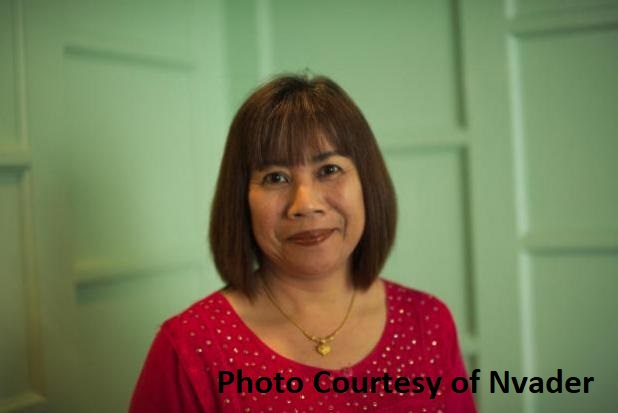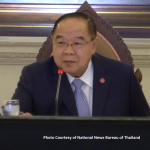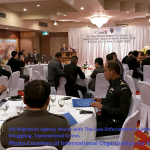
By Yvonne Bohwongprasert for The Bangkok Post on 19 February 2018,
Nvader, a non-government organisation dedicated to combating sex trafficking, has since 2014 been working closely with Thai law enforcement to bring criminals to justice and support survivors.
Last month that the organisation re-entered the public spotlight, bringing down one of Bangkok’s largest soapy massage parlours, Victoria’s Secret, after the Department of Special Investigation (DSI) received information from them about the case of a Myanmar girl who had been lured into prostitution at the establishment. The operation then kicked off. The televised raid exposed gross human trafficking, underage prostitution and other suspected offences.
Originally founded in New Zealand in 2011, Nvader (soon to be called LIFT International in April) prides itself on working towards strengthening justice structures, supporting victims and partnering with police to hold offenders accountable for crimes of human trafficking and child sexual exploitation. They are a registered charitable trust which depends solely on donations and public support.
According to Nvader’s director of Aftercare Janejinda Pawadee, who is a senior registered Thai social worker with over 15 years of experience in the area of human trafficking and child sexual exploitation, the Victoria’s Secret trafficking case was different and somewhat challenging investigate.
“DSI and DOPA [Department Of Provincial Administration] identified minors being forced to provide sexual services to customers in the Victoria’s Secret Soapy Massage Parlour, the youngest of which was only 12 years old. Many in Thai society believe that massage parlours such as Victoria’s Secret employ only adult sex workers to provide sexual services to clients. However, the Victoria’s Secret case exposed the fact that trafficking of children and minors still exists not only within small brothels and karaokes across Thailand, but also within these large massage business establishments,” said Janejinda.
“Combating child trafficking must involve sensitivity, especially with regards to the egregious nature of the crime. Survivors have been placed in situations involving labour trafficking, sex trafficking, child pornography and extreme exploitation. In Thailand, the government is working to take a victim-centred approach, which is recommended by the US government and different international governing bodies.”
When child victims give their testimony in court, there are good mechanisms that are in place such as child interview rooms and multidisciplinary teams to support child survivors including psychologists and social workers present during their interviews, Janejinda said. While shedding light on the reasons for their success, she said that because human trafficking involves organised criminal networks, to beat them at their own game, “they believe it takes a network to effectively combat a network”.
Janejinda has also seen a push in recent times towards greater collaboration and drawing upon everyone’s core competencies and strengths in order to construct a united effort to fight trafficking.
“In order to address trafficking, we assist law enforcement to identify cases of forced labour, including forced prostitution, child begging, child sexual exploitation and child pornography,” she said. “Nvader works with local law enforcement agencies and receives requests for assistance directly from our partner government agencies. We work exclusively within legal frameworks with law enforcement partners in order to identify victims and perpetrators of trafficking.
“The core of Nvader’s focus and strategy comes from the call for sharing resources to strengthen and grow capacity. Nvader also works in close partnership with grassroots NGOs in order to share information and provide care to survivors.”
Janejinda said their team is comprised of qualified and experienced Thai national professionals, lawyers, investigators and social workers. They also prioritise assisting law enforcement agencies to identify and prosecute criminals.
Prosecution is not just about apprehending criminals, she said, it’s about more than keeping criminals behind bars.
“It has a much larger impact and effects that ripple outwards. It’s about accountability: about showing traffickers that law enforcement is serious about apprehending them, that the criminal justice system is serious about prosecuting offenders and that the punishments will be commensurate to the crime. This in turn increases deterrence, which essentially comes via an increase in convictions of offenders of human trafficking.”
Moreover, she said that one of Nvader’s core focuses is to offer legal representation and aftercare to support and protect survivors throughout the criminal prosecution of their abusers all the way through to reintegration. Their teams advocate for the rights of survivors while simultaneously educating survivors of their rights and options.
During police operations, she said their team plays a part in monitoring standards and practices, as well as overseeing the management and treatment of victims of trafficking to guarantee that their rights and dignity are respected.
“Nvader’s lawyers pursue applications for court orders requiring those abusers to pay compensation directly to their victims. To date, Nvader has successfully claimed around 5.2 million baht in compensation for survivors,” she said.

Janejinda, who describes each and every human trafficking case as being complex, layered and requiring a nuanced approach, said that since 2014 Nvader has worked on child labour and begging, child sexual abuse, adults and children trafficked for the purposes of sexual exploitation, and children trafficked for online exploitation and child pornography.
Janejinda opts to take a positive approach on where Thailand stands today on this issue saying that it has some of the best legal protection of any country within the Asean region.
“The Thai Anti-Trafficking Persons Act was written in 2008 and enacted in 2009, so it is only 10 years ago that Thailand’s first anti-human trafficking police division was formed.
“Anti-trafficking is a sector in which governments across the globe are working to formulate effective strategies, and it’s an area that requires incredible nuance in how you approach convictions, arrests and prosecutions. Therefore governments around the world are still developing the resources and the expertise necessary to combat this crime.”
Sharing her personal concerns on the issue, Janejinda said that as a Thai citizen, she believes it’s pivotal for Thai society not turn a blind eye to the issue of human trafficking in the country, saying that it’s important for families, parents and schools to be educating children and vulnerable communities about the risks of human trafficking.
Equally important is for everyone to make sure that we keep this issue at the forefront of public attention, so that as Thais we can together work to solve this issue.
“The first step to solving a problem is acknowledging it, and once we are educated about this issue, then we must all play our part in supporting efforts to end human trafficking in our home country. For some, that might mean donating funds to civil society groups that are providing support services to survivors. For others, it might mean raising awareness in your schools or places of work. For business owners, it means making sure there are fair and transparent business and labour practices within companies. We all have a role to play in tackling this issue,” noted Janejinda.
Prior to sharing their future goals, the head of aftercare said that one of the most encouraging achievements they had seen in past years was the strong, collaborative relationships that have developed between their team and local law enforcement, in terms of shared learning and partnership.
“Nvader’s goal is to continue to strategically identify needs and fill these gaps. We are honoured to come alongside local law enforcement to mentor, train and build capacity. In 2018, we will be working to increase our legal support services to survivors, in order to strengthen access to justice for survivors, including representation in court and claims for compensation. Our aftercare team of social workers will be partnering with NGOs in the Mekong region to strengthen repatriation and reintegration efforts.”
On changing their name to LIFT International, Janejinda said their new branding reflects their desire to “lift survivors, lift justice, and lift standards”.
“It reflects the way we operate and as we look to the future we believe this name can help us to achieve our vision: Freedom for the exploited. Justice that protects. A world where human trafficking is not tolerated. We hope to achieve this vision through prosecuting and preventing human trafficking by strengthening justice systems. We aim to lift and raise the lives and hopes of survivors of exploitation and trafficking towards freedom.”
Source: https://www.bangkokpost.com/lifestyle/social-and-lifestyle/1414415/going-from-strength-to-strength




